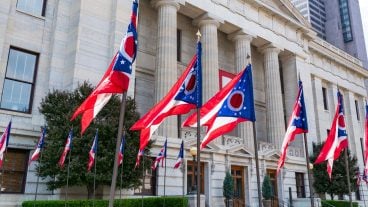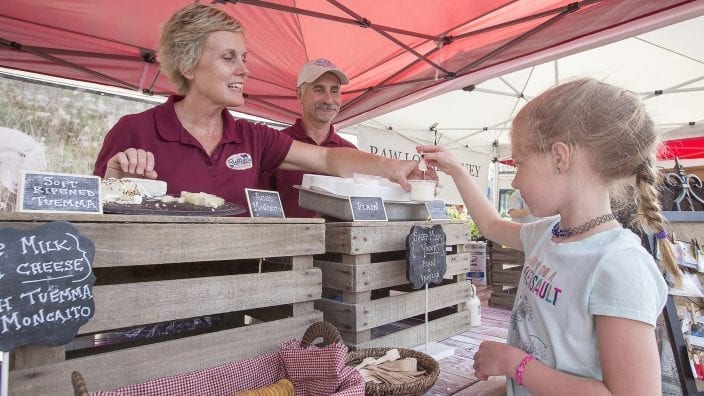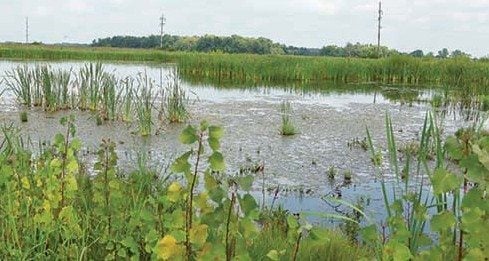Farmer’s Guide to Trucking Regulations available to Ohio Farm Bureau members
The guide includes a farm driver checklist, overview of state and federal regulations and exemptions, CDL qualifications and more.
Read More
I have been thinking of writing about water quality all summer, and today is the day. I don’t claim to have the solution to the algal blooms in Lake Erie, but I would like to share a perspective that the mainstream media seems to miss.
I had reason to travel the turnpike from Warren to Toledo several times this spring. I drove through Streetsboro, the southern suburbs of Cleveland, North Ridgeville, Avon, Elyria, Lorain, Amherst and Vermilion. It always seems like there is new construction in these metropolitan areas.
Once I got past these areas, I started to see more and more agricultural land, especially along the south side of the turnpike. This part of Ohio has always had more farmed acreage. The fields and equipment are bigger than what my family has in Trumbull and Geauga counties. I love to see the fields being tilled, planted and growing.
But there was very little of that during my May trips. The wheat was flooded. Tractors were still because most of the other fields were flooded as well.
I’m sure you have heard and read about the severe weather that has left much of northwestern Ohio unplanted this year. That also means that far less manure and fertilizer were applied, which some say is the solution to the algal bloom problem in Lake Erie. Yet still, the problem remains with the National Oceanic and Atmospheric Administration forecasting the third- or fourth-largest algal bloom on record.
Adam Sharp, executive vice president of the Ohio Farm Bureau, summed it up well: “The disconnect between bloom size and nutrient use demonstrates that reducing farming’s impact on water quality is a complex undertaking, which is why farm organizations are funding research into all pieces of the puzzle. These include dealing with phosphorus that has been in the ecosystem for years, unprecedented rainfall events and yes, managing nutrients to both benefit crops and protect water quality.”
I keep coming back to my travels on the turnpike seeing the ever-growing communities. There are more people living along the shores of Lake Erie than ever before. More pavement and storm drains than ever before. Water is getting to the lake faster than ever. This too, plays a part in water quality.
What strong cleaner did you use to wash that particularly dirty item in your driveway and is now entering the storm drain?
Oh, shoot, it unexpectedly rained right after the lawn care company just applied “weed and feed” to your yard and now phosphorus is headed for the stream. Or maybe you applied the fertilizer yourself, thinking, “I don’t really need to measure.”
Animal waste from our pets, dirt, cut grass, leaves and debris are major pollutants and should be prevented from entering storm drains and streams. Oh, and don’t flush unused medications!
I don’t like playing the “blame game” because it generally doesn’t get us anywhere. There are ways we can each help. Farmers are participants in trying to find solutions for water quality. Are you?
Submitted by Mary Smallsreed, a member of the Trumbull County Farm Bureau who grew up on a family dairy farm in northeast Ohio.
OFBF Mission: Working together for Ohio farmers to advance agriculture and strengthen our communities.


The guide includes a farm driver checklist, overview of state and federal regulations and exemptions, CDL qualifications and more.
Read More


Ohio Farm Bureau provides opportunities, platforms and resources to help you develop your voice in the industry and give farmers a seat at the table with leaders and legislators.
Read More

The emergency fuel waiver to allow the sale of summer gasoline blends containing 15% ethanol will lengthen the period during which Americans can continue buying E15 from June 1 to Sept. 15.
Read More

The Small-Scale Food Business Guide covers federal and state regulations for selling food products such as raw meat, dairy, eggs, baked goods, cottage foods, fruits and vegetables, honey and more.
Read More

New resources and technology are broadening the different types of sales tools and strategies available to farmers.
Read More

ODA will enroll 500,000 acres into the program for a two-week sign-up period, beginning April 22, 2024, through May 6, 2024. Contact local SWCD offices to apply.
Read More

Katie Share of Columbus has been named ExploreAg and Youth Development Specialist for Ohio Farm Bureau.
Read More

Mary Klopfenstein of Delphos has been named Young Ag Professional and Ag Literacy Program Specialist for Ohio Farm Bureau.
Read More

The plan has been updated to give sole proprietors access to more rate stability and a smart solution that offers potential savings on health care.
Read More

The American Farm Bureau Federation, in partnership with Farm Credit, is seeking entrepreneurs to apply online by June 15 for the 2025 Farm Bureau Ag Innovation Challenge.
Read More